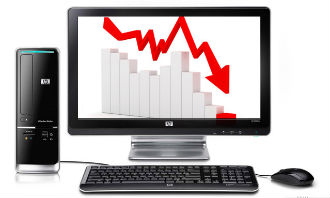 Combined worldwide shipments of tablets and PCs are expected to hit 493.1 million units, according to research from Canalys. The firm is expecting seven percent growth, but it will come from tablets rather than PCs.
Combined worldwide shipments of tablets and PCs are expected to hit 493.1 million units, according to research from Canalys. The firm is expecting seven percent growth, but it will come from tablets rather than PCs.
Tablets are forecast to account for 37 percent of the market, up from 25 percent last year.
By 2017, unit shipments should reach 713.8 million, but only a quarter of them will be laptops, while tablets should make up 64 percent of all shipments.
The tablet market is booming. It more than doubled in the first quarter of the year, while at the same time desktop and laptop shipments took a double-digit plunge. Tablet shipments in 2013 should hit 182.5 million units and by the end of the year they should outpace laptops.
Competition should heat up over the next few quarters, with traditional PC vendors vying for a piece of the lucrative tablet market. Windows 8.1 tablets are expected to start making their mark later this year, but they might not have what it takes to stand up to Android and iOS gear in the low end. Therefore many outfits are turning to Android tablets, including Acer, Asus, Lenovo and HP. However, the trouble with cheap Android tablets is that they’re not good money makers.
“Shipment numbers can be high but absolute margins on these products are expected to be small. Low-price tablets will not be lucrative but it is necessary to compete or a vendor will simply lose relevance and scale. In fact, accessories, particularly cases, as well as the new generation of high-tech app-enabled accessories will likely provide higher margins than the products themselves,” said Pin-Chen Tang, research analyst at Canalys. “This new influx of Android devices will provide a boost to the platform and Canalys therefore expects Android to take a 45% share in 2013, behind Apple at 49%. The iPad mini is expected to continue selling well, becoming more significant in terms of the product mix and spawning a further increase in consumer demand for smaller tablets.’
The other big unknown is Intel’s 2-in-1 convertible push. They should also start appearing later this year and vendors have already shown off some designs, but many are not convinced that they will do well. The first generation isn’t very impressive. They require pricey and relatively hot x86 chips, so they end up a bit bulkier than ARM-based tablets. In addition, Windows 8.x is still an unproven OS in the tablet space and it’s more bloated than Android or iOS.
“These convertible products have disappointed so far. Convertibles are too heavy in tablet form and too expensive when compared with clamshell product,” said the company. Canalys therefore expects that, for at least the next 18 months, consumers will buy separate products, rather than compromise on a Windows 8 convertible or hybrid PC. Even for Android products, alternative form factors are not expected to grow rapidly due to the category being sandwiched between low-priced slates and more familiar Windows-based clamshell notebooks,” said Canalys analyst James Wang.






